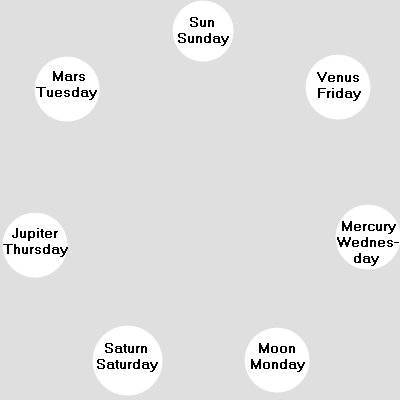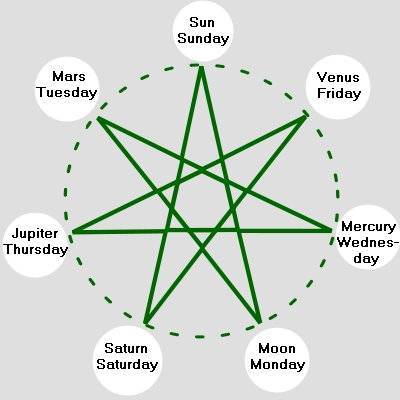Dan 7:25 And he shall speak great words against the most High, and shall wear out the saints of the most High, and think to change times and laws: and they shall be given into his hand until a time and times and the dividing of time.
Today, most people look forward to the weekend. For many people the weekend is a time of rest, a time away from the pressures of work and the daily grind. For most people the entire week points towards the weekend. The middle of the week is often called "hump day" because the week is half over, it marks the time that is half way between the weekend before and the weekend to come. People need a break, we need to unwind, we need to rest about once a week. This is Biblical. God created us and therefore knows our inner workings. God knows what we need better than we do, and he provided a day of rest for us. God instructs us to rest one day every week.
Exo 23:12 Six days thou shalt do thy work, and on the seventh day thou shalt rest: that thine ox and thine ass may rest, and the son of thy handmaid, and the stranger, may be refreshed.
This day of the week for rest is such an important day, that it is the only day of the week named in the Hebrew language. This day of rest is called the Sabbath. The other days of the week are simply called the "First day", "Second day", "Third day" etc... Each day points towards the Sabbath. In the ancient Hebrew, this idea of pointing towards the Sabbath went even further. In Ancient Hebrew, the days of the week were called "One into the Sabbath", "Second into the Sabbath", "Third into the Sabbath", "Fourth into the Sabbath", "Fifth into the Sabbath", "Eve of Holy Sabbath" and finally the "Sabbath". Every day of the week pointed to this day of rest, this holy and sanctified day..... The Sabbath. This day of rest was provided for us from the very beginning, from creation. God rested on the seventh day. It should come as no surprise to us then, that we should take a day to rest also.
Gen 2:1 Thus the heavens and the earth were finished, and all the host of them.
Gen 2:2 And on the seventh day God ended his work which he had made; and he rested on the seventh day from all his work which he had made.
Gen 2:3 And God blessed the seventh day, and sanctified it: because that in it he had rested from all his work which God created and made.
In the world today the weekend is often considered a time of relaxation and rest, but it is a much different type of rest than what the Bible describes. The rest that many people look forward to on the weekend often includes partying, beer drinking, bar hopping, eating out, shopping, boating, skiing, visiting amusement parks, and the list goes on and on. Is this what the Bible describes as a day of rest? If these are the types of things that we engage in on our "day of rest", it is likely that we will need another day to recuperate from our "day of rest'. The intent of the Sabbath is to rest from our daily activities. This Sabbath is intended to bring us closer to God. It is a day to do good. It is a day to be selfless, to forget our ambitions and to forget our self serving goals. The Sabbath is a day to forget about the pressures of life and to forget about money. The Sabbath is a day to just do good, and to nurture our relationship with our Heavenly Father. Can we forget about money, if we are spending it? Are we drawing closer to God, if we are partying and drinking? Are we being selfless, if all of our actions are intended to enhance our own pleasures? Will we be refreshed and rested, if at the end of our "day of rest" we are physically exhausted, frustrated, broke, or hungover? The day of rest that is intended by God is a day of selflessness. It is a true day of rest. The Sabbath is a day devoted to growing closer to God, and a day to distance ourselves from the things of the world. God's idea of a day of rest has been replaced by a day of self pleasure, disobedience, and activities that draw us away from God. How did that happen? God knew this would happen and the Bible told us it would happen.
Dan 7:25 And he shall speak great words against the most High, and shall wear out the saints of the most High, and think to change times and laws: and they shall be given into his hand until a time and times and the dividing of time.
The anti-christ beast has fulfilled the prophecy in Daniel 7:25. I will write specifically in terms of times here, but the entire prophecy has been fulfilled. The anti-christ beast has thought to change time. How can one change time? The beast has thought of two different ways to change time. One way was to change the calendar. Today we use Monday, Tuesday, Wednesday etc... when referring to a day of the week. What do we think of when we say "Monday"? Many people claim to hate Monday, mainly because it is the furthest day from the coming weekend. What comes to mind if we say "Tuesday". These names don't really have a point or a meaning, do they? In fact, these names have a very big meaning. Most of us just don't realize what it is. The names of the days that we use today all have pagan origins.
Sunday - Day of the sun. A day for worshiping the sun or the various pagan god's associated with it.
Monday - Day of the moon. A day for worshiping the moon or the various pagan god's associated with it.
Tuesday - Day of mars (Roman god of war), day of ares (Greek god of war), tiu's day (Germanic god of war and sky), tyr's day (same as tiu, but belonging to the Norse)
Wednesday - Day of mercury (Roman god of thievery, commerce, science), woden's day (chief god of the Anglo-Saxons. Same as Norse odin), day of hermes ( Greek god of thievery, commerce, cunning).
Thursday - Day of jupiter (chief Roman god of thunder and lightning), thor's day (Norse god of thunder), day of zues (chief god of the Greeks, god of the heavens).
Friday - Day of venus (Roman goddess of love and beauty), freya's day (Norse/Teutonic goddess of love, beauty and fertility) day of aphrodite (Greek goddess of love and beauty).
Saturday - Day of saturn or saturn's day (Roman god of agriculture), day of cronus/titan (Greek god who ruled the world until dethroned by his son, zeus).
That is a brief, albeit accurate list of the pagan idols from which our days of the week get their names. We don't worship these pagan idols, so what is the harm? We must remember that paganism is the worship of satan. Is anything good going to come from satan? The intent of satan is to draw our attention away from God, which he has accomplished by changing times. The antichrist beast has changed our calendar. Remember the ancient Hebrew names of the days of the week? The names of the days of the week all pointed towards the Sabbath, a day to rest and connect with God. Not only has the beast managed to change the names. It has managed to change the way we think about our day of rest. The seventh day is not commonly called the Sabbath any more. The seventh day is often called Saturday. The seventh day Sabbath, is no longer thought of as a day to reconnect with God, to be selfless and to do good for others. The Sabbath has been transformed into Saturday. Today's Saturday has become the opposite of the Sabbath that God made for us. It has become a self serving day, a day to provide pleasure for ourselves. A day to indulge in the things of the world and to distance ourselves from God.
What is the harm in a name change? Imagine if every time that we spoke the name of a day of the week, it reminded us of the Sabbath and of God. Would we think of God more often? Wouldn't God be on our minds constantly, if every time we consulted our schedule we were reminded of the Sabbath and our creator? That is what we have lost by allowing our days of the week to be renamed.
Most schools today do not teach creation. They do not teach about God. They do teach Greek mythology though. They teach about the pagan gods who our days are named after. What if the name of every day pointed to the Sabbath? Could our schools refuse to teach our children about the Sabbath and God? This is what we have lost by allowing our days of the week to be renamed.
But the names of the week have always been named as they are now. Right? No. The first verifiable mention of a seven day week in which each of the days is associated with a heavenly body comes from Vettius Valens in 170 A.D.. It was sometime after this that the present days of the week based on the heavenly bodies in conjunction with the Roman gods appeared. This change in times is not limited to the days of the week. It also includes the names of the months. Each month is also named after a Roman god. The renaming of the months is even more recent than the renaming of the days. The Gregorian calendar was introduced by Pope Gregory XIII on February 24, 1582. It wasn't adopted by Britain and what would become the Eastern U.S. until 1752. China, Albania, Russia, Latvia, Bulgaria, Romania, USSR, Greece and Turkey all adopted the Gregorian calendar between 1912 - 1929. Historically speaking this is a "new" calendar.
The Bible has foretold all of this. Let's take a look at Rev 12:15 And the serpent cast out of his mouth water as a flood after the woman, that he might cause her to be carried away of the flood.
We need to understand a little bit about the symbols used in the Bible to understand this verse. The Bible defines the symbolic meaning of the words used in this verse. Some people will interpret the "water" in this verse as meaning "people" because of Rev 17:15 And he saith unto me, The waters which thou sawest, where the whore sitteth, are peoples, and multitudes, and nations, and tongues. Rev 17:15 is an aid to interpreting a specific set of verses in Rev 17. It is not a rule of law when searching for the symbolic meaning of "waters" throughout the entire Bible. Our guide to understanding symbolism in the Bible, is creation itself.
People are symbolized by plants. Grass, flowers, trees etc...
Grass is symbolic of the multitudes. How do we know this? The Bible specifically tells us that "All flesh is grass" and "the people is grass" in these verses.
Isa 40:6 The voice said, Cry. And he said, What shall I cry? All flesh is grass, and all the goodliness thereof is as the flower of the field:
Isa 40:7 The grass withereth, the flower fadeth: because the spirit of the LORD bloweth upon it: surely the people is grass.
Notice those verses also tell us that the "goodliness" of the grass "is as the flower of the field". In other words, flowers of the field are good people. Now let's move on to trees. Trees are symbolic of leaders as we see in this next verse.
Jdg 9:8 The trees went forth on a time to anoint a king over them; and they said unto the olive tree, Reign thou over us.
There are many other verses that show trees to be symbolic of leaders, but this is the one that came to mind right now. Whether we are grass, a tree or a flower of the field, we require spiritual nourishment. That spiritual nourishment is symbolized by water as we will see in these verses.
Isa 11:9 They shall not hurt nor destroy in all my holy mountain: for the earth shall be full of the knowledge of the LORD, as the waters cover the sea.
This verse compared "waters" to the "knowledge of the LORD". These next verses compare rain and snow to the word of God.
Isa 55:10 For as the rain cometh down, and the snow from heaven, and returneth not thither, but watereth the earth, and maketh it bring forth and bud, that it may give seed to the sower, and bread to the eater:
Isa 55:11 So shall my word be that goeth forth out of my mouth: it shall not return unto me void, but it shall accomplish that which I please, and it shall prosper in the thing whereto I sent it.
These next verses may not be quite as obvious to some, but we should still come away with the idea that the "waters" spoken of here are spiritual nourishment from God.
Isa 55:1 Ho, every one that thirsteth, come ye to the waters, and he that hath no money; come ye, buy, and eat; yea, come, buy wine and milk without money and without price.
Isa 55:2 Wherefore do ye spend money for that which is not bread? and your labour for that which satisfieth not? hearken diligently unto me, and eat ye that which is good, and let your soul delight itself in fatness.
Isa 55:3 Incline your ear, and come unto me: hear, and your soul shall live; and I will make an everlasting covenant with you, even the sure mercies of David.
This next verse compares " words of a man's mouth" to "deep waters. It then tells us that "the wellspring of wisdom" is like "a flowing brook". Pro 18:4 The words of a man's mouth are as deep waters, and the wellspring of wisdom as a flowing brook.
One of the best examples that compares water to spiritual nourishment comes from Jesus Himself in this next verse.
Joh 4:14 But whosoever drinketh of the water that I shall give him shall never thirst; but the water that I shall give him shall be in him a well of water springing up into everlasting life.
It is up to us to decide what water we drink from. Some spiritual nourishment does not come from God and we should not drink from those waters. Some water comes from the serpent. This is what Revelation 12:15 is telling us.
Rev 12:15 And the serpent cast out of his mouth water as a flood after the woman, that he might cause her to be carried away of the flood.
In this verse the beast is spewing forth so much water (spiritual nourishment), that it is seen as a flood sent to destroy the woman which symbolizes the church or Body of Christ. This renaming of the days and months is part of that flood. It is all designed by satan to destroy the church. It is designed to distance us from God.
I wrote above that the beast had thought to change time in two different ways. One of which, was by changing the calendar. The other, is by changing the day of rest and worship. This is certainly tied to the attempt at changing God's law, but I will focus on the change in time aspect here. God said in Exo 20:8 Remember the sabbath day, to keep it holy. Exo 20:9 Six days shalt thou labour, and do all thy work: Exo 20:10 But the seventh day is the sabbath of the LORD thy God: in it thou shalt not do any work, thou, nor thy son, nor thy daughter, thy manservant, nor thy maidservant, nor thy cattle, nor thy stranger that is within thy gates:
The beast wants to distract us. The beast wants us to do the exact opposite of what God wants us to do. The beast wants us to work on the Sabbath. The beast wants us to be self serving on the Sabbath. The beast wants us to worship on exactly the opposite day that God has designed for us. he has exchanged the seventh day for the first day of the week. he has attempted to substitute the last day for the first day. God says work then rest. The beast says party and play then work. Think of this like credit. Is it better to save money, and then buy what you want? Or is it better to just buy what you want now on credit? The credit is very seductive, but isn't what is in our best interest.
Now for the order of the days of the week and their corresponding planets and pagan gods. Is there a method to this? There is indeed. We need to know a little bit about the Ptolemaic system to understand the order. The Ptolemaic system was commonly believed for at least the 1500 years prior to 1600 A.D.. The Ptolemaic system is a description of the cosmos where Earth is at the orbital center of all celestial bodies. In other words, everything was thought to orbit around the earth. The Ptolemaic system asserts that the order of the heavenly bodies, from the farthest, to the closest to the Earth, is: Saturn, Jupiter, Mars, Sun, Venus, Mercury, Moon. That does not line up with the order they are used in the days of the week which is: Sun, Moon, Mars, Mercury, Jupiter, Venus, Saturn. So how did the designers of the weekly cycle come up with the order? First, they placed the heavenly bodies in a circle in the Ptolemaic order. satan wants to replace the SON (Jesus) with the sun, so he had them place the Sun at the top of the circle. That will place the moon (closest to the earth) and saturn (furthest from the earth) at the bottom of our circle. Next, they placed the corresponding day of the week in each circle.

As you can see a simple trip around the circle does not give us the days of the week in order. To come up with satan's order for the days of the week, we simply apply his mark. The heptagram which is known among Pagans as the Elven Star or Fairy Star. Among pagans the heptagram is a sacred symbol with magical powers.

Now the order of the days is clearly visible as we start with Sunday and follow the lines of the heptagram to the next heavenly body or day on our chart.
The beast also challenges God in the particular planet and pagan god chosen to represent God's Sabbath. Remember up above when I described what the pagan meaning behind each day is? Take another look at Saturday.
Saturday - Day of saturn or saturn's day (Roman god of agriculture), day of cronus/titan (Greek god who ruled the world until dethroned by his son, zeus).
Isn't it a little ironic that saturn is the pagan god of agriculture as if satan is saying he will nourish the plants. Remember we are God's garden. Isn't it a little ironic that the pagan god titan ruled the earth until he was dethroned by zeus. What is satan's wish? To dethrone God, to take the place of God. Is this a message from satan to God that his plan involves replacing the Sabbath with his own day of worship?
So what do we do about this? People tell me that it is just ridiculous, to think we can change the calendar back to the Biblical calendar. I will always respond that there is no feat too great for God. If it is the will of our Father that the calendar be changed, it will be changed. In the meantime we can use God's calendar in our own lives, within our own mind. What if when we thought of Monday, we also thought of the second day into the Sabbath. We might then start using God's calendar within our family and within our church. If we do, we will certainly move closer to God.
Exo 23:13 And in all things that I have said unto you be circumspect: and make no mention of the name of other gods, neither let it be heard out of thy mouth.
What if we would have listened to God and taken heed of that verse? We wouldn't have had this calendar to begin with. I can't help but believe that we would have been much closer to God in that case. Imagine a world where everyday points to the Sabbath, a day of rest. Imagine a world where everyday points to God.








